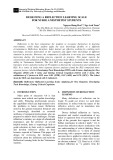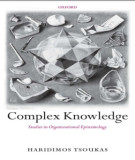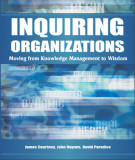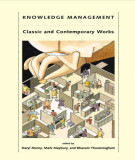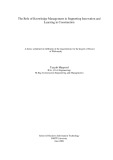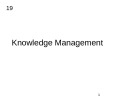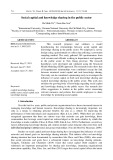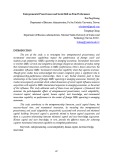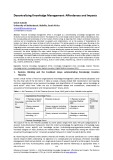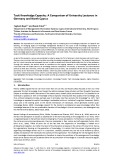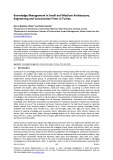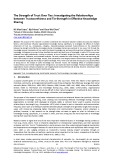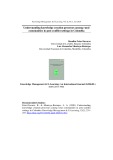
Tacit knowledge
-
Ebook Purchasing management: Part 2 includes contents: Chapter 9 Supplier Selection with focus on choice of evaluation criteria; Chapter 10 Supplier selection using a fuzzy linear programming model; Chapter 11 Supplier selection using ISO standards; Chapter 12 Tacit knowledge transfer, a crucial part of supplier development; Chapter 13 Supplier development with quality focus; Chapter 14 Supplier‐buyer collaboration, one way to reach success; Chapter 15 Information sharing, the driver of a proficient buyer‐supplier relationship; Chapter 16 Appendices; Chapter 17 Bibliography.
 96p
96p  haojiubujain03
haojiubujain03
 24-07-2023
24-07-2023
 9
9
 4
4
 Download
Download
-
This paper reports the construction and validation of Reflection in Learning Scale (RLS) to estimate the reflection’s ability in Vietnamese Students. The first RLS was mapped a fourteen items scale from literature review and pilot testing of 76 students to find out the construction and validation of RLS.
 4p
4p  vidoctorstrange
vidoctorstrange
 06-05-2023
06-05-2023
 4
4
 1
1
 Download
Download
-
Ebook Complex knowledge: studies in organizational epistemology – Part 1 presents the following content: Chapter 1: The Tyranny of Light: The Temptations and the Paradoxes of the Information Society; Chapter 2: David and Goliath in the Risk Society: Making Sense of the Conflict between Shell and Greenpeace in the North Sea; Chapter 3: Forms of Knowledge and Forms of Life in Organized Contexts; Chapter 4: The Firm as a Distributed Knowledge System: A Constructionist Approach; Chapter 5: What is Organizational Knowledge? Chapter 6: Do We Really Understand Tacit Knowledge?
 175p
175p  runthenight08
runthenight08
 12-04-2023
12-04-2023
 5
5
 1
1
 Download
Download
-
Ebook Inquiring organizations: Moving from knowledge management to wisdom: Part 2 presents the following content: Chapter IX Avoiding epistemological myopia; Chapter X Inquiring organizations and the wisdom of tacit knowledge for a heideggerian inquiring system: The Sixth sense; Chapter XI Mindfulness: An essential quality of integrated wisdom; Chapter XII Wise organizations? Chapter XIII The phenomenon of duality: A key to facilitate the transition from knowledge management to wisdom for inquiring organizations; Chapter XIV Understanding organizational philosophies of inquiry through herme...
 204p
204p  runthenight08
runthenight08
 12-04-2023
12-04-2023
 6
6
 1
1
 Download
Download
-
Ebook Knowledge emergence, social, technical, and evolutionary dimensions of knowledge creation – Part 2 presents the following content: Chapter 9: Multinational enterprises and cross-border knowledge creation.
 159p
159p  runthenight08
runthenight08
 12-04-2023
12-04-2023
 7
7
 1
1
 Download
Download
-
Ebook Knowledge management: Classic and contemporary works – Part 2 presents the following content: Chapter 9 Tacit Knowledge, Unarticulated Needs, and Empathic Design in New Product Development; Chapter 10 Enabling Complex Adaptive Processes through Knowledge Management; Chapter 11 Knowledge Sharing Shifts the Power Paradigm; Chapter 12 From Capitalizing on Company Knowledge to Knowledge Management; Chapter 13 Evolution through Knowledge Management: A Case Study; Chapter 14 Classic Work: The Balanced Scorecard: Learning and Growth Perspective; Chapter 15 Measuring Intangibles and Intellect...
 213p
213p  runthenight08
runthenight08
 12-04-2023
12-04-2023
 10
10
 4
4
 Download
Download
-
Ebook Managing industrial knowledge: Creation, transfer and utilization – Part 2 presents the following content: Chapter 8: How Should Knowledge be Owned? Chapter 9: Following Distinctive Paths of Knowledge: Strategies for Organizational Knowledge Building within Science-based Firms; Chapter 10: The Modularity Trap: Innovation,Technology Phase Shifts and the Resulting Limits of Virtual Organizations; Chapter 11: Can Knowledge Management Deliver Bottom-line Results? Chapter 12: How Tacit Knowledge Explains Organizational Renewal and Growth: the Case of Nokia; Chapter 13: Knowledge is Commitm...
 175p
175p  runthenight08
runthenight08
 12-04-2023
12-04-2023
 4
4
 2
2
 Download
Download
-
The rationale developed in the above section leads to the following set of objectives: 1. To investigate the role of KM as an enabler of innovation; 2. To investigate the role of KM in enhancing learning and transforming an organisation into a learning organization; 3. To demonstrate the role of KM in enhancing learning and, more specifically, enhancing learning in construction organisations.
 209p
209p  runthenight04
runthenight04
 02-02-2023
02-02-2023
 6
6
 1
1
 Download
Download
-
This study aims to develop a theoretical model and verify the relationship between tacit knowledge sharing and individual performance in the aviation industry with the motivating role of personal motivation and social contextual factors. This paper offers some implications for managers in the airlines to stimulate tacit knowledge sharing and enhance employees’ performance.
 12p
12p  vicedric
vicedric
 08-02-2023
08-02-2023
 3
3
 2
2
 Download
Download
-
Organization theory and design: Lecture 19 provides students with content about: knowledge management; knowledge management – some facts; explicit knowledge; tacit or implicit knowledge; explicit knowledge management mechanisms; implicit knowledge management mechanisms;... Please refer to the lesson for details!
 7p
7p  hanlamcoman
hanlamcoman
 26-11-2022
26-11-2022
 6
6
 3
3
 Download
Download
-
This research proposes and validates a model hypothesizing the relationships between social capital and knowledge sharing in the public sector. We employed a survey design using a questionnaire to collect data utilizing a convenient sampling method.
 15p
15p  inception36
inception36
 30-11-2021
30-11-2021
 6
6
 1
1
 Download
Download
-
This study contributes to the entrepreneurship literature, social capital theory, the resource-based view, and incremental innovation, by revealing that entrepreneurial proactiveness and social adaptability are positively associated with structural and relational capital building. Structural capital is positively related to human capital acquisition, and there is a positive relationship between relational capital and tacit knowledge acquisition.
 12p
12p  viseulgi2711
viseulgi2711
 30-08-2021
30-08-2021
 14
14
 2
2
 Download
Download
-
Personal Knowledge Management (PKM) is envisaged as a decentralizing Knowledge Management (KM) revolution and as a vital educational concern. The objective of a current design science research (DSR) undertaking is, thus, the conceptualizing and prototyping of a PKM System (PKMS) aiming at departing from today’s centralized institutional solutions and at strengthening individuals’ sovereignty and collaborations, not at the expense of Organizational KM Systems, but rather as the means to foster a fruitful co-evolution.
 17p
17p  quenchua8
quenchua8
 29-09-2020
29-09-2020
 13
13
 2
2
 Download
Download
-
The study was carried out to provide an intercultural comparison, which is currently lacking in the Knowledge Management field. The research findings have highlighted the factors influencing the transfer and the accumulation of tacit knowledge.
 12p
12p  quenchua8
quenchua8
 29-09-2020
29-09-2020
 21
21
 1
1
 Download
Download
-
This paper explores the extent to which small medium Architecture, Engineering and Construction firms (AEC) in the construction sector implement knowledge management (KM) approaches. Using data from semi-structured interviews of twenty-eight AEC firms operating in the construction sector, KM needs and challenges are analyzed and discussed. Breakdown of SME’s into micro, small and medium sub-categories reveals that the management of, in particular, tacit knowledge becomes complicated as firms grow in size.
 15p
15p  quenchua8
quenchua8
 29-09-2020
29-09-2020
 25
25
 0
0
 Download
Download
-
The purpose of this research is to better understand the interaction between notable structural and relational factors, which positively influence organizational knowledge sharing. Specifically, to investigate the effects of multiple dimensions of trust (i.e., competence-, integrity-, benevolence-based perceived trustworthiness) on the relationship between tie-strength and effective knowledge sharing.
 15p
15p  quenchua8
quenchua8
 29-09-2020
29-09-2020
 12
12
 0
0
 Download
Download
-
This paper reports on a participatory action research study, which explores how ICT application adoption may be enhanced through ‘empathetic participatory design’ as a method for creating knowledge that may have meaningful application utility. This is achieved through user behavioural simulation. The main mode of data collection and analysis was the repertory grid technique used to elicit constructs from simulated prototyped elements of a selection of applications.
 17p
17p  quenchua8
quenchua8
 29-09-2020
29-09-2020
 17
17
 0
0
 Download
Download
-
Effective knowledge management and organisational learning in the context of sustainable development
The aim of this paper is to explore how Knowledge Management (KM) and learning can be instrumental for governments’ policy making and implementation, and to analyse how KM with the consideration of local culture and a bottom-up approach can increase its effectiveness.
 14p
14p  quenchua8
quenchua8
 29-09-2020
29-09-2020
 19
19
 0
0
 Download
Download
-
This study adapted the SECI model, which explains the conversion between tacit knowledge and explicit knowledge through knowledge socialization (S), knowledge externalization (E), knowledge creation (C), and knowledge internalization (I) (Nonaka & Takeuchi, 1995). Considering the SECI Model as a theoretical referent in order to comprehend the KCP, Grounded Theory Methodology (GTM) was used to build theory from the systematic analysis of data collected from July 2013 to January 2015.
 26p
26p  dayhoctainha
dayhoctainha
 10-09-2020
10-09-2020
 23
23
 0
0
 Download
Download
-
The most valuable and remarkable human knowledge exists more implicitly. Sharing and managing this implicit knowledge is considered very difficult, so investigating the factors that may affect knowledge sharing has become a colorful area of research. The focus of this study is to examine the relationship between individual (individual attitude, organizational commitment, and knowledge self-efficacy) and tacit knowledge sharing. The study distributed 650 questionnaires among teaching staff in public higher educational institutes. Out of 650, only 320 questionnaires were returned.
 8p
8p  tozontozon
tozontozon
 25-04-2020
25-04-2020
 19
19
 5
5
 Download
Download
CHỦ ĐỀ BẠN MUỐN TÌM










